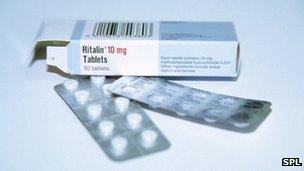'I've missed a year of school with ADHD'
- Published

Parents and teachers need training in what ADHD means
On the day 10-year-old Corey Francis was expelled from school, he was playing football with his friends in the playground.
"I kicked the ball and it hit the teacher. It wasn't very hard, but the Head said I kicked it hard," he says.
He has not been back to school at all in the year since.
Instead he spends the day at home with his grandma, while his parents work, waiting for the day he can return to school.
"It's very boring," he says. "I would rather be with my friends at school, working or playing football."
Corey, from north London, has attention deficit hyperactivity disorder or ADHD, in common with around 5% of school age children, and he is also on the autistic spectrum.
As a result, he gets angry very easily, he finds it hard to concentrate and he needs lots of structure and supervision - something his family said the school was not able to provide.
The ADHD VOICES study team used recordings of their interviews with children to create cartoon versions of them - Video from ADHD VOICES
His experience of life with ADHD is just one of many in the UK which suggests that the diagnosis and treatment of this child psychiatric disorder requires some work.
Little voice
A new report, based on interviews with more than 150 children in the UK and the US diagnosed with ADHD, tries to understand how children think and feel about having this disorder.
Led by Dr Ilina Singh, reader in bioethics and society at King's College London, the ADHD Voices study gives children a voice in the debate over drug treatment with stimulants.
Stimulants like Ritalin and Adderall have caused controversy in the past, with some people raising concerns that they can cause harm and turn children into robots or zombies.
But the study finds that these stimulants, which are prescribed because they help to reduce hyperactivity and improve concentration, have a positive impact on their behaviour and their ability to make better decisions.
"In areas of moral development we don't find evidence of harms," says Dr Singh. "These assumptions are hurting children more than the drugs.
"Children talk about how good it was to have a moment to think when a bully taunts them, for example. This is what stimulants help them do."
The team behind the study interviewed children between the ages of 9 and 14.

Ritalin is one stimulant which can be prescribed to treat ADHD
Although not all children who were interviewed were on medication, it was unusual that a child had no experience of taking medication at some stage since diagnosis.
"Those on medication were more able to feel they could exercise control. Even if they'd been on medication and weren't any more, they had learnt strategies to deal with their behaviour."
'Spark'
Prof Peter Hill, a child and adolescent psychiatrist, says it is not that controversial any more to say that medication works for children with ADHD.
"Every treatment guideline says medication is going to be part of the package somewhere. It's an important part of the package, as well as having to teach families about ADHD."
He explains that stimulants increase the amount of dopamine in the child's brain, which it is lacking, and restore the brain to normal function.
"Some children feel they've lost a bit of spark, and no child likes taking medicines but in my experience they like what it does for them."
However, Dr Singh goes on to say that treatment should not just focus on drugs.
"The message is that children want more treatment options. We don't have well-developed behavioural treatments in this country. Medication is not the only treatment we should be relying on."
Meditation, cognitive behavioural therapy, flexible learning environments and physical exercise are all seen as important to try alongside medication.
Another important finding from the interviews, Dr Singh says, is that children did not often understand their condition or feel they had any meaningful conversations with their doctors.
Too often, they were weighed and measured and hurried out the door without being asked any questions.
Dr Stephen Westgarth, a consultant child and adolescent psychiatrist in Northumberland and medical director of Child Psychiatry UK, says this is unacceptable.
"We've got to see the child not the disorder - and not just focus on the medication. We are not responding properly to the child if we don't listen to them."
Cultural divide
The interview project has led Dr Singh to suggest there was one notable difference in the experiences of UK and US children with ADHD.
In the UK, the focus was on making these children behave well whereas in the US the stress was on making them perform well academically.
She says the UK children reported encountering bullying on a regular basis at school, perhaps because of the constant focus on managing their behaviour.
Some children said they were bated by other children and encouraged to behave badly, just to get a reaction.
"We don't have a good sense of how we manage these things [in the UK]. There is not as much support from teachers."
Ten-year-old Corey wishes he'd had someone to talk to about his problems, someone at school who could supervise him and mentor him.
He tried taking Ritalin, which gave him a vocal tic, then another drug which did not help much and recently he has just started on yet another drug to reduce his aggression.
If he had received a correct diagnosis when his problems first started then perhaps he would not be sitting at home now.
Andrea Bilbow, founder of ADDISS, the National Attention Deficit Disorder Information and Support Service, agrees that there is a lack of understanding in schools.
"Schools should have been trained to identify it and carry out proper behaviour interventions, but some teachers provoke the children with ADHD and so do other children.
"It all comes down to attitude. Some schools are fantastic but others are awful."
More than anything, Corey wants to get the right treatment, go back to school and be normal again.
"I used to be the best football player in the school," he says.
- Published30 September 2010
- Published23 May 2011
- Published30 September 2010
- Published22 September 2010